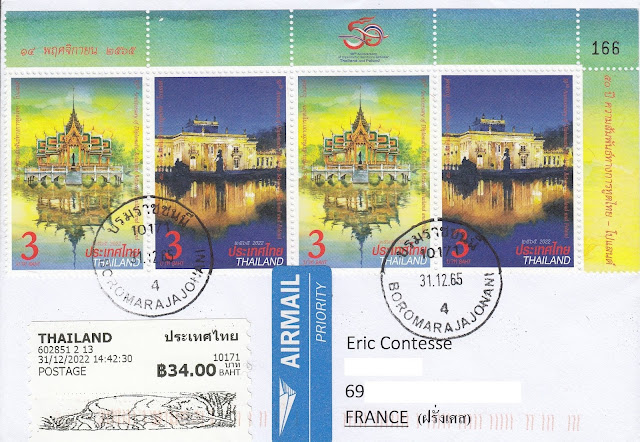Série "Palais flottants", commune avec la Pologne, sur FDC de Thaïlande
Le 14 novembre 2022, les administrations postales de Thaïlande et de Pologne ont mis en circulation une jolie série commune (2 timbres) illustrant des "palais flottants", afin de célébrer le 50ème anniversaire (jour pour jour) de l'établissement de relations diplomatiques entre les 2 pays.
Les 2 pays entretiennent aujourd'hui des relations étroites, dans le domaine économique (la Thaïlande est pour la Pologne le 2ème partenaire commercial de l'ASEAN), culturel ou scientifique.
Les 2 pays ont imprimé ces 2 timbres dans un feuillet similaire composé de 8 timbres (4 paires).
Deux paires de cette série (3 baht, tirage : 250000) émise par la poste thaïlandaise figurent sur cette jolie lettre avec TAD Premier Jour de Sam Sen Nai, bureau postal situé dans le quartier de Phaya Thai (centre de Bangkok),
où est implanté le musée philatélique thaïlandais. Merci beaucoup Thapanaphong !
On November 14, 2022, the postal administrations of Thailand and Poland put into circulation a nice joint series (2 stamps) illustrating "floating palaces", in order to celebrate the 50th anniversary (to the day) of the establishment of diplomatic relations between the two countries.
The two countries now maintain close relations, in the economic (Thailand is for Poland the 2nd commercial partner of ASEAN), cultural or scientific fields.
The two countries printed these two stamps in a similar sheetlet composed of 8 stamps (4 pairs).
Two pairs from this series (3 Baht, print run: 250,000) issued by the Thai Post have been used on this pretty cover with First Day cancellations from the post office of Sam Sen
Nai in the district of Phaya Thai (central Bangkok), where the Thai
Philatelic Museum is located. Thank you very much Thapanaphong!
Ce palais de style classique a été construit sur une île artificielle qui divise un lac en deux parties.
L'origine de l'actuel Palais remonte à la fin du 17ème siècle. Sur l'ordre du prince Herakliusz Lubomirski, homme politique, écrivain et philosophe parmi les plus illustres de son temps fut construit un pavillon abritant des bains, dans un style baroque rococo.
En 1766, le roi Stanisław II August transforma le pavillon en Palais-sur-l'Île, de style classique. Inspiré des réalisations italiennes telles que la Villa Borghèse ou la Villa Medicis, il devait incarner le rêve d'un état idéal, moderne et souverain.
This postmark represents the Łazienki Palace or Palace-on-the-Isle ("Pałac Na Wyspie"), located in the Łazienki park in Warsaw, also featured on one of the two stamps of this joint series, from a watercolor by the Polish artist Andrzej Gosik.
This classic styled palace was built on an artificial island that divides a lake into two parts.
The origin of the current Palace dates back to the end of the 17th century. On the order of Prince Herakliusz Lubomirski, politician, writer and philosopher among the most illustrious of his time, a pavilion housing baths was built in a Baroque Rococo style.
In 1766, King Stanisław II August transformed the pavilion into this classic-styled Palace-on-the-Isle. Inspired by Italian achievements such as the Villa Borghese or the Villa Medici, it was to embody the dream of an ideal, modern and sovereign state.
A noter dans la marge supérieure la présence du logo officiel du 50ème anniversaire de ces relations diplomatiques, créé par Mayuree Narknisorn pour la poste thaïlandaise.
L'autre timbre de cette série reproduit une aquarelle du peintre thaïlandais Thaneth Ponchaiwong, représentant le pavillon flottant du Palais royal de Bang Pa-In, aussi connu sous le nom de "Palais d'été", un palais autrefois utilisé par les rois de Thaïlande, situé sur la rive du fleuve Chao Phraya, dans le district de Bang Pa-In, dans le sud de la province d'Ayutthaya.
La plupart des bâtiments actuels de ce Palais royal, dont ce pavillon flottant ("Aisawanthipphaya-at"), pavillon thaï en teck construit au milieu d'un lac, ont été construits entre 1872 et 1889 par le roi Rama V.


Aucun commentaire:
Enregistrer un commentaire